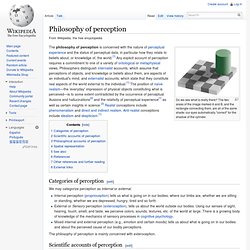

Google Scholar.
The Great Courses homepage. Can I Learn to Read Faster and Get Through My Backlog of Books? Advice on how to read faster is all good and well, BUT: 1) Why does everything have to happen FASTER FASTER FASTER and why do you think you need to read MORE MORE MORE?

It's not about quantity, but about quality. If you read good books, you're not done by the time you get to the last page. You have to think about it later and make sense of it. If you read books that don't require deep thinking like this, then there's no reason for you to want to read even more of these shallow works. 2) Speed reading in any but the most specialised and narrow contexts is completely useless. 3) From a literary perspective, audio books are not at all the same as printed / electronic books, because most writers write to be read, not to be heard, so they write sentences in ways that only appear special to you if you read them.
The Victorian Web: An Overview. Philosophy of perception. Do we see what is really there?

The two areas of the image marked A and B, and the rectangle connecting them, are all of the same shade: our eyes automatically "correct" for the shadow of the cylinder. The philosophy of perception is concerned with the nature of perceptual experience and the status of perceptual data, in particular how they relate to beliefs about, or knowledge of, the world.[1] Any explicit account of perception requires a commitment to one of a variety of ontological or metaphysical views. Categories of perception[edit] We may categorize perception as internal or external. Internal perception (proprioception) tells us what is going on in our bodies; where our limbs are, whether we are sitting or standing, whether we are depressed, hungry, tired and so forth.External or Sensory perception (exteroception), tells us about the world outside our bodies.
Samsara. Becoming Minimalist. TOPIX. Tokyo Stock Price Index (東証株価指数?)

, commonly known as TOPIX, along with the Nikkei 225, is an important stock market index for the Tokyo Stock Exchange (TSE) in Japan, tracking all domestic companies of the exchange's First Section. It is calculated and published by the TSE. As of 1 February 2011[update], there are 1,669 companies listed on the First Section of the TSE, and the market value for the index was ¥197.4 trillion.[1] The index transitioned from a system where a company's weighting is based on the total number of shares outstanding to a weighting based on the number of shares available for trading (called the free float).
This transition took place in three phases starting in October 2005 and was completed in June 2006. TSE currently calculates and distributes TOPIX every second and further plans to launch a new High-Speed Index dissemination service provided at the millisecond level starting from February 28, 2011. History of TOPIX[edit] Statistics (Close Price)[edit] Nikkei 225. Note on study. Change in technology. Even the way pschology effects people as a. It seems like sociology can help with things. I'm not a believer in psychology, but some non. Life is spiritual. On duty. Science and Technology Studies: Opening the Black Box. Nyu soiology technology. Official Church of Scientology.
George Bernard Shaw Quotes. Library of Congress Digital Collections & Programs. Historic Newspapers Enhanced access to America's historic newspapers through the Chronicling America project.

Historic Sound Recordings The National Jukebox features over 10,000 78rpm disc sides issued by the Victor Talking Machine Co. between 1900 and 1925. Performing Arts Collections, articles and special presentations on music, theater and dance materials from the Performing Arts Encyclopedia. Prints and Photographs Catalog of about half of the Library's pictorial holdings with over 1 million digital images. Veterans History Project Experience first-person stories of wartime service through personal artifacts, audio and video interviews. Understanding Mankind.
Math. Philosophy. Logic. Chemistry. Reading and methods. Outward human condition.